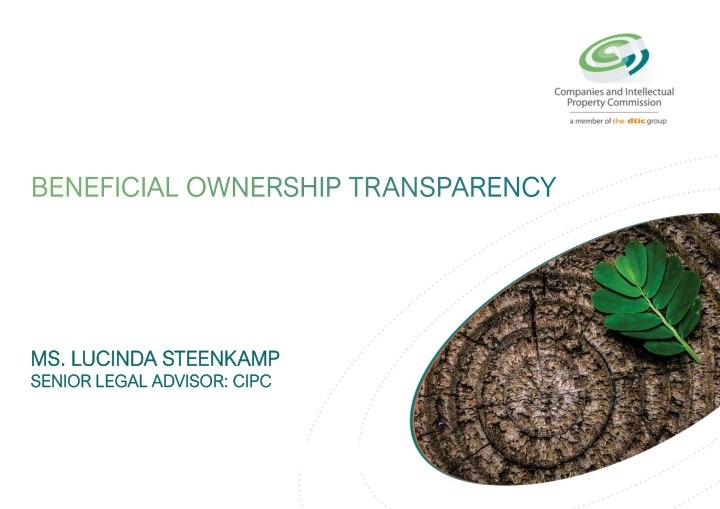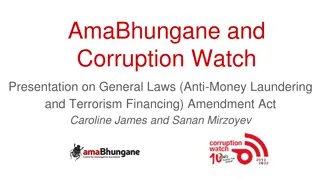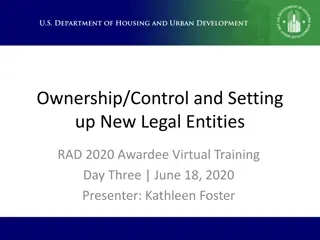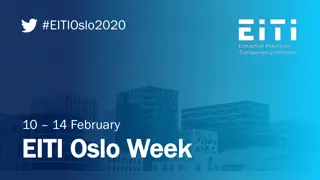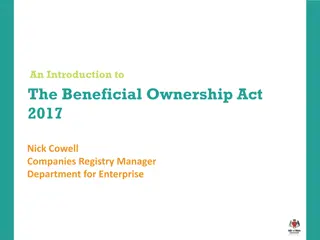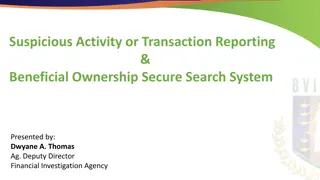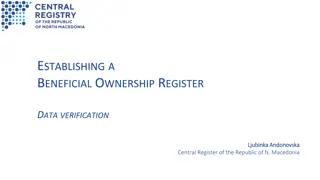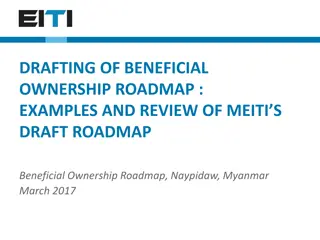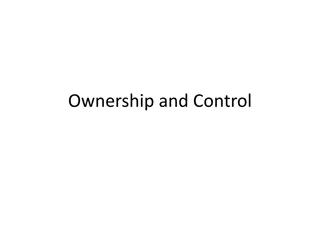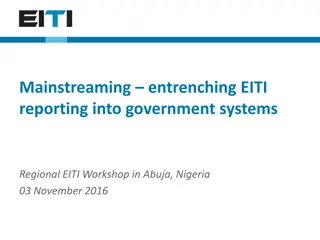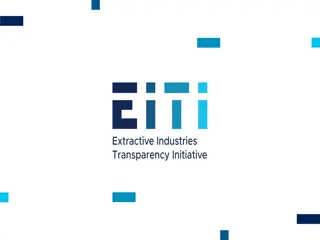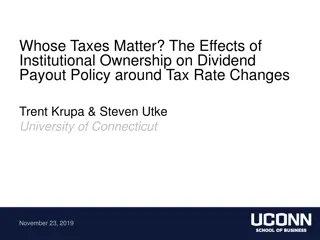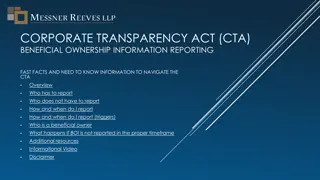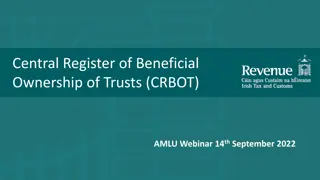BENEFICIAL OWNERSHIP TRANSPARENCY
South Africa's CIPC is addressing deficiencies in beneficial ownership transparency, as highlighted in the October 2021 Mutual Evaluation Report. The country faces increased monitoring due to being placed on the FATF Grey List. CIPC is mandated to establish a Beneficial Ownership Register to ensure accurate and timely information availability. Compliance with regulations and response to FATF requirements are crucial for addressing strategic deficiencies and vulnerabilities.
Download Presentation

Please find below an Image/Link to download the presentation.
The content on the website is provided AS IS for your information and personal use only. It may not be sold, licensed, or shared on other websites without obtaining consent from the author.If you encounter any issues during the download, it is possible that the publisher has removed the file from their server.
You are allowed to download the files provided on this website for personal or commercial use, subject to the condition that they are used lawfully. All files are the property of their respective owners.
The content on the website is provided AS IS for your information and personal use only. It may not be sold, licensed, or shared on other websites without obtaining consent from the author.
E N D
Presentation Transcript
BENEFICIAL OWNERSHIP TRANSPARENCY BENEFICIAL OWNERSHIP TRANSPARENCY MS. LUCINDA STEENKAMP MS. LUCINDA STEENKAMP SENIOR LEGAL ADVISOR: CIPC SENIOR LEGAL ADVISOR: CIPC
COUNTRY MUTUAL EVALUATION ASSESSMENT FINDINGS - OCTOBER 2021 MUTUAL EVALUATION REPORT (MER) CIPC participated in the FATF Assessments and based on the country mutual evaluation assessment findings as contained in the October 2021 Mutual Evaluation Report (MER), considered addressing those specific deficiencies relating to making BO information of companies (corporate vehicles) available in a timely, accurate, adequate and verified way to law enforcement agencies and other Regulatory bodies. South Africa should revise and substantially improve its mechanisms for ensuring that accurate, up-to-date, and verified BO information is timely available to competent authorities South Africa should thoroughly assess the ML/TF vulnerabilities of all types of legal persons, including vulnerabilities that facilitate corruption in government procurement LEAs should be granted better powers to gain direct and timely access to ownership and control information for legal persons and LEA officers, who investigate financial crimes, be further trained about company structures to enable them to more quickly identify and obtain BO information. Empower the CIPC to impose administrative penalties directly; then the CIPC should apply sanctions for failure to comply with information requirements
ROLE OF CIPC The Regulator in terms of the Companies Act, 71 of 2008 (as amended) read with the applicable Regulations. CIPC has, inter alia a responsibility to educate on and promote Voluntary Compliance, monitor Compliance, investigate non- compliance and/or contravention of the Act (and other legislation), as well as enforce compliance. The General Laws Amendment Act, 22 of 2022, written into law in December 2022, amended the Companies Act to mandate CIPC to establish a Beneficial Ownership Register Companies Act Regulations Amendment was promulgated on 24 May 2023 (GG Notice 48648), which provides legal backing to the requirements of the GLAA and the subsequent Companies Act amendment.
RESPONSE TO FINANCIAL ACTION TASK FORCE (FATF) On 24 February 2023, South Africa was put on a FATF GreyList which means that South Africa is placed under increased monitoring, while the country has committed to resolve identified strategic deficiencies. CIPC had to respond to the following, after an action plan was issued, viz. ensure that competent authorities have timely access to accurate and up-to-date Beneficial Ownership (BO) information on legal persons and arrangements, and apply sanctions for breaches of violations by legal persons to BO obligations;
CIPC RESPONSE TO FATF REPORT CIPC released the Beneficial Ownership Register functionality on its e-services platform on 1 April 2023. The functionality provides for corporate vehicles (companies and close corporations) to submit with the CIPC details regarding its beneficial ownership status (5% and above) in terms of mentioned corporate vehicles. Failure to submit the required information is tantamount to non- compliance of the Companies Act, which could result in court ordered administrative fines.
CIPC REPORT IN ADDRESSING THE INEFFICIENCIES (CONT) Recommendation 4 Actions (data sharing) CIPC has MoU s with most law enforcement agencies for direct access to the CIPC database to aid in the investigation processes and as part of the annual report we report on such statistics of usage. There are officers within CIPC (disclosure division) dedicated to assisting law enforcement with affidavits and provision of corporate information/ certified copies/ originals for court purposes and / or appearing as experts for matters being prosecuted in court. With the establishment of the BO register, access will continue to be timely, virtual and direct for LEAs.
WHAT IS BENEFICIAL OWNERSHIP? beneficialowner in respect of a company, means an individual who, directly or indirectly, ultimately owns that company or exercises effective control of that company, including through- (a) the holding of beneficial interests in the securities; (b) the exercise of, or control of the exercise of voting rights; (c) the right, or control of the right to appoint and remove directors; The ability to exercise control, through a chain of ownership, of- A juristic person other than a holding company of that company; A body of persons corporate or unincorporate (i.e. body corporate of an estate NPC); A person acting on behalf of a partnership; A person acting in pursuance of a trust or agreement (i.e. trustees, beneficiaries of trusts, beneficiaries of an agreement); (a) the ability to otherwise materially influence the management of the company. State owned companies (SOC s) will also be required to file BO information, unless exempted by the Minister in terms of section 9(2) of the Companies Act.
CIPC MEMBER OF THE INTER-DEPARTMENTAL COMMITTEE ON BENEFICIAL OWNERSHIP TRANSPARENCY (IDC BOT) CIPC is committed to the establishment and maintenance of the BO Register, hence we have contributed as a member of the committee since 2015 (though some years the committee was not active). The CIPC BO-Register was rolled out on 1 April 2023 and to date we have received 216 successful filings of BO information. Data received on this register will also be analysed on a risk based approach to ascertain trends around the world with regards to ultimate owners of corporate vehicles. The main purpose of BOT (beneficial owner transparency) is to assist law enforcement in the fight against money laundering and financing of terror activities. CIPC continues to support and form part of engagements where private sector or civil society is involved, to provide clarity and certainty.
EXAMPLE OF BENEFICIAL OWNERSHIP Sipho Mambe Lucia Smit ABC Trust Owns 4% Owns 5% Owns 60% Company A Company A owns / controls 100% of the declaring company. Lucia Smit owns 31% indirectly of the declaring company through a separate agreement Declaring company
EXAMPLE OF BENEFICIAL OWNERSHIP Lucia Steyn is 80% shareholder in ABC Marketing (Pty) Ltd ABC Marketing would not be required to file BO information in terms of Lucia Steyn, because the 80% shareholding refers to known information (shareholder, legal owner). The information in terms of above would be provided to the CIPC in the form of the filed securities register. (Section 33(1)(Aa) of the Companies Act) Within each company s securities register, the prescribed BO-information must be recorded (section 50 of the Act). In other words no separate recordal / filing. If, for example, Lucia Steyn held 25% (of her 80% shareholding) in ABC Marketing (Pty) Ltd on behalf of Luan Smit the 25% effectively being held to the benefit of Luan Smit, makes him a beneficial owner of ABC Marketing (Pty) Ltd and this information must be declared. The beneficial ownership information (of Luan Smit) would also be indicated in the securities register of ABC Marketing as per the Companies Act requirements.
BENEFICIAL OWNERSHIP REGISTER The submission of beneficial ownership information is done through a fully automated functionality, to be updated as and when the information changes, but not less than once annually. The register functionality can be found on the e-services platform. Any person can file BO information on behalf of a legal person, provided that a written mandate is in place for such filing. The mandate forms part of the compulsory supporting documents that must be filed. The disclosure of this register is anticipated to be an online (automated) process, in line with the existing disclosure process, with the caveat that requestors of this information will be vetted and verified as LEA s and regulatory bodies / accredited authorities. The aim of the BO-register is to have a repository / register of natural persons who own or exercise control over legal entities and to assist law enforcement (both nationally and internationally) with relevant information when it comes to the investigation of the ultimate owners of entities.
DISCLOSURE AND ACCESS REGIME TO THE DATA MoU s to allow for data sharing with competent authorities and law enforcement Data sharing, transparency and the requirements of POPIA, must all be taken into account and applied concurrently Online capability to access basic data to continue Data on listed and unlisted entities to be consolidated for use Data on financial crime convictions to be consolidated for use
COMPLIANCE, INVESTIGATIONS AND ENFORCEMENT Non-compliant BO filings to trigger a possible investigation, compliance notice. Risk based approach to be followed in the monitoring of the BO Register filings and sampling thereof Compliance Notices; Administrative fines; Disqualification of directors - to be some of the sanctions File a complaint for non-compliance CoR135.1complaints@cipc.co.za
NEXT STEPS MOU S with registries: The Commission has conducted an analysis with regards to external companies registered and identified key jurisdictions engaging to conclude MOU s, while others are already in place. Information sharing with other regulators and law enforcement agencies (LEA s): The Commission has been working with other agencies (SARS, FIC, FSCA, etc.) in developing the system to collect BO information with the objective that this information will be triangulated. Plans for listed companies (defined as Affected Companies in GLAA): The Commission provides a separate dispensation in relation to Affected Companies which are listed on a recognised Exchange. The purpose of this is mainly to avoid the duplication of records in that such info is already collected and kept in the records on other Competent Authorities (i.e. STRATE and Computershare). The sharing of this information will be periodically on an Inter-Agency basis. This will however not include Affected Companies which are not listed on exchange.
CHANGE MANAGEMENT (LINKS) https://www.cipc.co.za/wp-content/uploads/2023/05/USER- GUIDELINES-BO-LEGISLATIVE-REQUIREMENTS.pdf https://www.cipc.co.za/wp-content/uploads/2023/05/Beneficial- Owner-Filing-Requirements-Guidance-Notice-25_May-2023.pdf https://www.cipc.co.za/wp-content/uploads/2023/05/Companies- amendment-regulations-2023.pdf https://www.cipc.co.za/?page_id=4160 (BO FAQ s)
THANK YOU QUESTIONS WELCOME!
